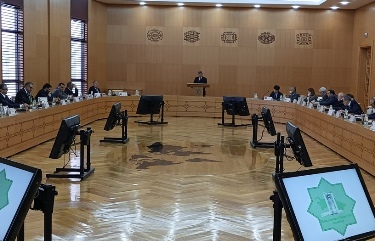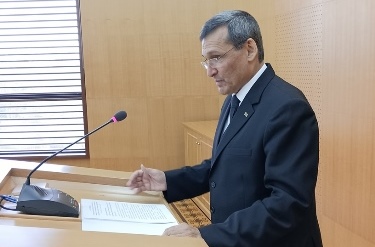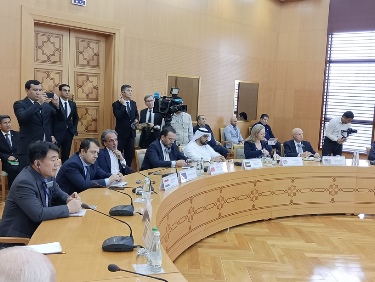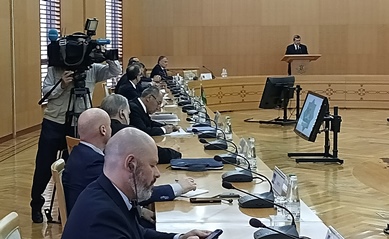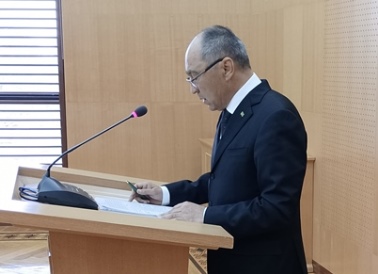nCa Report
“It is not just a city. It is more than a city,” said Darya Orazov.
He was speaking on Tuesday, 28 March 2023, at a briefing conducted by the deputy prime minister and foreign minister of Turkmenistan, Rashid Meredov, at the foreign office in Ashgabat.
The purpose of the briefing was to acquaint the diplomats and journalists with the salient features of Arkadag City, a creative extravaganza of bold architecture, a fusion of the past, the present and the future.
The first phase of the Arkadag City has recently been completed at the cost of nearly USD 3 billion and Manat 7 billion (total about USD 5 billion). It is located not far from the historic town of Goekdepe, about an hour’s drive west of Ashgabat. Preparations are in hand to hold a grand ceremony to unveil this futuristic city to the world.
DPM Meredov gave introductory remarks outlining the administrative and legal structure of the Arkadag City. He also gave input throughout the briefing, which took the shape of conversation with the representatives of the diplomatic missions and international organizations based in Ashgabat.
Darya Orazov is the chairman of the state committee responsible for the design and planning of the Arkadag City and the supervision of its construction by the dozens of contractors.
Orazov is an architect by profession and has vast experience in managing the construction sector at the national level.
Before summarizing his remarks, we would like to sum up the opening speech of DPM Meredov and his interaction with the ambassadors and heads of international and regional organizations.
Meredov gave particular attention to describing the legal status of the Arkadag City. He referred to the law of Turkmenistan ‘On the City of Arkadag’ promulgated on 23 March 2023, and said that it is a City of State Importance [Significance].
Some diplomats sought clarification and Meredov said that it is a city with no precedence therefore it is not possible to offer any comparison. He said further that the capital of Turkmenistan is Ashgabat, quelling the speculation that the Arkadag City could possibly transform into something like the capital of Turkmenistan at some point in the future.
The freshly passed law that Meredov referred to, provides the framework for the administration and functioning of the Arkadag City.
The translation of the complete text of the law is given at the end of this report.
Meredov said that the location of the Arkadag City is not a random choice – he said that it is one of the places where the history of the Turkmen people began. He said that the area was a hub of science and culture and will regain that status.
He mentioned that the heads of the 57 state structures were appointed under the state decrees a few days ago and most of them are comparatively young. These are the people who will be responsible for the legal and administrative management of the city.
Meredov invited the participants for their opinion and any questions.
The Russian ambassador said that it will be an example not just for the other cities in Turkmenistan but also for other cities in the world. He said that we want our cities to attain this level of sophistication.
He said that many Russian companies are interested in joining the second phase of the construction of the Arkadag City. He suggested that a delegation of specialists from Turkmenistan visit Russia to discuss the possibilities.
The American asked about the commute time between the Arkadag City and Ashgabat. He also asked about the friendly features for the people with disabilities.
Orazov answered that the means between Arkadag City and Ashgabat are available already and shuttle service could be introduced depending on the requirements.
As for the features for making the city accessible for the people with disabilities, he mentioned that it was taken care of at the time of designing the structures and roads. He said that there would be the ease of use for the people with restricted mobility, on the wheelchairs, and also the people with impaired vision.
With a slight tinge of humour, he said that the features have been added for those who are always glued to their smartphones.
On the question asked by several ambassadors as to when will the inauguration of the Arkadag City take place, Orazov said that preparations were in hand and the exact date will be announced later.
The ambassador of the OSCE said that the Arkadag City will be under the global spotlight including the entire OSCE space. He said that there would be the need to prepare for the attention the city would attract. He said that some joint projects could be done with mutual consultation.
The head of the WHO chapter in Turkmenistan and currently the acting resident coordinator of the UN system said that a number of projects could be done together with the Arkadag City. He suggested that it could right away be declared as the tobacco-free city.
The Romanian ambassador asked about the scope of declaring any cities as the sister cities of the Arkadag City. DPM Meredov said that we are looking for friendship, and are always open to proposals.
The ambassador of the EU said that a park could be created in the Arkadag City representing the flora of the entire territory of Turkmenistan.
The Japanese representative said that there is wide scope for cooperation with the international companies.
Darya Orazov, the chairman of the state committee responsible for the design, planning, and construction of the Arkadag City said that the entire construction work in the first phase was done by the local companies.
He said that there was no compromise on harmony with nature.
Orazov said that rainwater and flood water would be used for the irrigation and watering requirements of the city. The buses and taxis would mainly be battery-driven or hybrid.
The young people were given the chance to participate in the designing and planning of the city, said Orazov. The tenders for the software for the city were won by the educational and research establishments and their students wrote most of the software used in the various facilities in the Arkadag City.
For the second phase, he said, joint work with the foreign companies could be considered.
The local populations who were living on the territory of the Arkadag City would be given housing in the newly built residential blocks, Orazov said.
* * *
The construction of the marvellous Arkadag City is certainly a great achievement but why put such a sharp focus on it. — This is the question many are asking.
To answer it, we should start by mentioning that the idea of the Arkadag City was not fetched out of the thin air. It is a successive process.
Experiments at small scale and only for a limited number of novelties were carried out in the design and construction of some structures in Mir-7, the Kishi and Bekerwe settlements at the edge of Ashgabat, and in the Annew district. This was built on the modernization of two villages on the western outskirts of Ashgabat.
The goal was always: How to build a sustainable city.
As Meredov and Orazov pointed out during the briefing, there is a continuous, non-stop process of learning and applying the lessons that have been learned.
Learning cannot be confined to a location or a small group of people. That is why Turkmenistan is trying to make it a global collaborative exercise to find how to build a sustainable city.
It is also for the same reasons that there are no plans to fill the city with residents to its total capacity immediately. This will be a gradual process of learning and applying those lessons.
Actually, the people are the X factor here.
We have built a city with the latest in every field but how would the people use it. Will they quickly adjust to the new ways of doing many things? Would they automatically acquire the acumen to use the classy gadgetry and services? Will they act responsibly when no one is looking?
Then, there is the question of integration and compatibility of the things with each other. Can the small shop automate some of its retail functions including the non-cash, non-human payment and delivery? Will the post office be able to function smoothly with its medium tech branches in the country? How long will it take for the maintenance and repair teams to get firm grip on their responsibilities?
There is so much to learn.
This quest here is to learn how to build a sustainable city. The official inauguration of the Arkadag City will be just the start of this journey.
* * *
Here is the unofficial, slightly paraphrased translation of the Law of Turkmenistan On the City of Arkadag
Law of Turkmenistan on the city of Arkadag
This Law determines the legal status of the city of Arkadag, as well as the legal, organizational and other bases for the activities of public authorities in connection with the implementation of the functions of the city of Arkadag.
CHAPTER I. GENERAL PROVISIONS
Article 1. Legal status of the city of Arkadag
The legal status of the city of Arkadag is established in accordance with its special significance as an administrative-territorial unit demonstrating the successes of Independent and Neutral Turkmenistan, as well as long-term prospects for the development of the country based on the centuries-old historical experience of the Turkmen people and modern trends in the international practice of state building.
For the city of Arkadag, a special legal status is established – a city of state significance.
The legal status of the city of Arkadag is based on the Constitution of Turkmenistan and is determined by this Law and other normative legal acts of Turkmenistan.
Article 2. The territory of the city of Arkadag
The territory of the city of Arkadag is an integral part of the territory of Turkmenistan.
The territorial division of the city of Arkadag is carried out in accordance with the legislation of Turkmenistan.
The territorial units of the city of Arkadag are etraps, which are formed taking into account their historical, geographical and urban features, population, socio-economic and other characteristics.
The formation, transformation and abolition of etraps in the city of Arkadag, the assignment of names to them, the establishment and change of their boundaries is carried out in accordance with the legislation of Turkmenistan.
Article 3. The population of the city of Arkadag
The population of the city of Arkadag is made up of citizens of Turkmenistan who reside in the city of Arkadag, regardless of the length of residence, place of birth and nationality, as well as foreign citizens and stateless persons permanently or temporarily residing in the city of Arkadag.
Article 4. Property of the city of Arkadag
The city of Arkadag owns the funds of the city budget, the property of city enterprises and institutions, as well as other objects that are not owned by other legal entities or individuals in accordance with the law.
In accordance with the legislation of Turkmenistan, the city of Arkadag may own property located outside the territory of the city of Arkadag.
On behalf of the city of Arkadag, the powers of the owner are exercised by the public authorities of the city of Arkadag within their competence, established by regulatory legal acts that determine the status of these bodies.
CHAPTER II. BODIES OF STATE POWER
Article 5. Local representative bodies of state power of the city of Arkadag
In accordance with the Constitution and laws of Turkmenistan in the city of Arkadag and its etraps, the local representative bodies of state power are the Halk maslahaty of the city of Arkadag and the Halk maslahaty of its etraps.
The procedure for the election of members of the halk maslahaty of the city of Arkadag and its etraps is established by the laws of Turkmenistan.
Article 6. The executive power of the city of Arkadag
The executive power in the territory of the city of Arkadag is exercised by the hyakim of the city and the hyakims of the etraps.
The Hyakim of the city of Arkadag is appointed by the President of Turkmenistan.
The hyakim of the city of Arkadag is accountable to the President of Turkmenistan.
The Hyakims of the etraps of the city of Arkadag are appointed by the President of Turkmenistan on the proposal of the Hyakim of the city of Arkadag.
Hyakims of the etraps of the city of Arkadag are accountable to the Hyakim of the city of Arkadag.
Article 7. Powers of the khyakim of the city of Arkadag
The khyakim of the city of Arkadag:
1) directs and controls the activities of the hyakims of etraps belonging to its territory, in fulfilling the tasks assigned to them and exercising their functions, generalizes work experience, takes measures to improve the style and methods of their activities;
2) develops and submits to the Cabinet of Ministers of Turkmenistan draft programs for the socio-economic development of the relevant territory, takes part in their discussion, organizes their implementation;
3) develops a draft budget of the city and a report on the implementation of the budget and submits them to the Cabinet of Ministers of Turkmenistan for approval;
4) together with the ministries, other central executive authorities, takes part in the consideration of issues on the placement, construction, reconstruction and specialization of industrial, agricultural and other industrial and social infrastructure facilities in the relevant territory;
5) takes measures for the rational use and protection of lands, subsoil, waters, forests, atmospheric air, flora and fauna, other natural resources in the relevant territory and exercises control in this area in the manner prescribed by the legislation of Turkmenistan;
6) manages the facilities located in the relevant territory, which are under the jurisdiction of the city;
7) ensures the implementation of measures for the social protection of the population, improvement of housing and living conditions for persons with disabilities, large, low-income families, material support for preschool and general educational institutions, boarding schools, health-improving, rehabilitation and sanatorium-resort institutions in the relevant territory;
8) jointly with the ministries and other central executive authorities, manage the institutions of education, healthcare, culture and sports, social security and take measures to improve their material and technical base;
9) organize and control the implementation of sanitary-epidemiological, quarantine and hygiene measures in the relevant territory; informs the population about the environmental situation; in cases of natural disasters, epidemics, epizootics and accidents, takes the necessary measures to eliminate their consequences and ensure the safety of the population; suspends the activities of enterprises, institutions and organizations that pose a threat to the environment and lead to a violation of the legislation of Turkmenistan on nature management;
10) ensures compliance with the procedure for the operation of the housing stock established by the legislation of Turkmenistan, the sustainable functioning of communal and road facilities, trade, public catering and consumer services, electrical, gas, water and other networks and facilities, communications and transport, takes measures to provide the population natural gas, water and electricity;
11) organizes and controls, within its powers, the implementation of legislation in the military sphere, manages civil defense in the relevant territory;
12) takes measures to ensure the interaction and coordinated work of state bodies, enterprises, institutions, organizations of all forms of ownership in protecting the rights and legitimate interests of citizens, strengthening public order and legality in the relevant territory;
13) regularly hear reports from the relevant managers on measures to prevent offenses, eliminate the causes and conditions that contribute to their commission. Organizes, together with law enforcement and other bodies, work to analyze the state of crime prevention and takes measures to prevent crime in the relevant territory;
14) organizes and controls the activities of the hyakimlik, appoints and dismisses specialists and other employees of the hyakimlik, organizes their professional training, retraining and advanced training;
15) resolves other issues within the powers established by the legislation of Turkmenistan.
Article 8. The procedure for the formation of local branch offices, services, bodies and organizations of executive power in the city of Arkadag
Local branch administrations, services, bodies and organizations of executive power in the city of Arkadag are formed in direct subordination to the relevant ministries and branch administrative bodies in coordination with the Cabinet of Ministers of Turkmenistan and the hyakim of the city of Arkadag in accordance with the legislation of Turkmenistan.
Article 9. The procedure for appointing heads of local branch executive authorities in the city of Arkadag
In accordance with the special status of the city of Arkadag as a city of state significance, the appointment and dismissal of heads of local branch executive authorities in the city of Arkadag is carried out by the head of the central branch executive authority of Turkmenistan (ministries, departments) in coordination with the Cabinet of Ministers of Turkmenistan and the hyakim of the city of Arkadag.
CHAPTER III. Judicial power and law enforcement agencies
Article 10. Judicial power
Justice in the city of Arkadag is carried out only by the court.
The judicial system of the city of Arkadag is an integral part of the judicial system of Turkmenistan and includes the court of the city of Arkadag, etrap courts of the city of Arkadag.
Article 11. Law enforcement agencies
Protection of life, health, rights and freedoms of citizens of Turkmenistan, foreign citizens, stateless persons, counteraction to the commission of crimes, protection of public order, property, observance of the rule of law, ensuring national security in the city of Arkadag is carried out by internal affairs bodies, prosecutor’s Office, national security and other law enforcement agencies, the organization and procedure of which are determined by the legislation of Turkmenistan.
CHAPTER IV. Final provisions
Article 12. Financial and logistical support of the city of Arkadag
The financial and logistical support of the city of Arkadag is carried out in accordance with the legislation of Turkmenistan.
Article 13. Entry into force of this Law
This Law shall enter into force from the date of its official publication.
President of Turkmenistan, Serdar Berdimuhamedov.
Ashgabat, March 23, 2023. /// nCa, 29 March 2023
